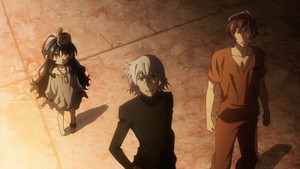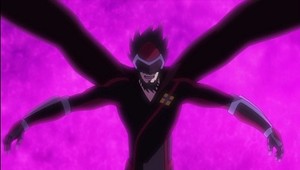Winter 2013: Theron Martin
by Theron Martin,
Vividred Operation
Rating: 2.5 (of 5)
Review: This particular future has, in many respects, turned out ideally: the development of something called a Manifestation Engine has made clean energy readily available and strife over resources largely unnecessary. 14-year-old Akane lives in such a world with her younger sister Momo and her grandfather, the man who designed the Manifestation Engine but has since been discredited over an incident a few years earlier. She's an active, athletic type who also scoots around on a one-of-a-kind flying bike developed by her grandfather. As she soon discovers, though, that's not all that her grandfather has developed for her, nor is the world as peaceful as she imagined. The Alone are coming with apparent intent to claim the Manifestation Engine, and Akane and friend Aoi (who gets caught in the midst of a firefight while flying back to their island home) may be the only ones who can stop them.
Despite all of the sci fi elements present in the set-up, the first episode actually makes this look like a magical girl series done My-Otome-style – in other words, a magical scheme based on high-tech tools rather than true magic. It even has the standard “magical girl duo” pair of an athletic-type with short reddish hair and a pretty girly-girl with long, dark hair. It also finds a rather ridiculous way to get a cutesy, talking animal mascot into the picture (the grandfather ends up getting body-switched into a plushie squirrel during an accident, you see) and has an elaborate, high-tech-looking transformation scene which seems even more utterly out-of-place with what's happening at the time than the norm. The emphasis on butt shots of the girls suggests that this is intended much more as otaku bait than something aimed at a typical magical girl audience, however.
The technical merits for the first episode actually look pretty good and it does have a thrilling (if also a bit ridiculous) action sequence later on. Characters who have yet to slow the slightest bit of freshness or originality hold the writing back, though. The concept does look somewhat promising, but something will have to be done about those characterizations for this one to excel.
Vividred Operation is currently streaming on Crunchyroll.
 Oreshura episode 2
Oreshura episode 2Rating: 4 (of 5)
Review: Chiwa has gotten wind that Eita and Masuzu are now apparently a couple and isn't happy about it. Sensing what her real objection might be, Masuzu decides to toy with her using Eita's old notebook (much to his dismay), which include making a “Club For Young Maidens to Recreate Themselves” (“Nice-Self-Creation” for short) and using the notebook as a textbook to help make Eita more popular and catch the attention of the star basketball player. The first step? Get her to pretend to be a guitar player. Even the sharp-witted Masuzu underestimates just how determined Chiwa is when she sets her mind to something, however.
The Deviously Manipulative Girl is a relatively common archetype in anime, but she is almost always a major supporting character rather than the female lead. That alone gives this romantic comedy a fresher relationship twist, but the creator and producers weren't content to rely just on the strength of that gimmick. By showing that her efforts have a result other than the intended one, and that Chiwa may be more of a girl to be reckoned with that Masusu initially seemed to think, the storytelling kicks up another notch. There is a bit more subtlety going on here than the usually-brassy romantic comedy genre typically employs, too, but all of this still wouldn't work as well if this episode didn't also manage some very funny content; while Eita still has yet to distinguish himself much, Masuzu is comedy gold when not sexily playing up to him.
The light but very subdued color scheme is still an irritant, as it makes the whole work look faded, but the second episode definitely elevates the series’ game. While the quality jump isn't at a Toradora! level, Oreshura is nonetheless now showing a lot of potential to be one of the better recent entries in this genre.
Oreshura is currently streaming on Crunchyroll.

Problem children are coming from another world, aren't they?
Rating: 3.5 (of 5)
Review: “This letter is for those of you with many troubles and extraordinary powers. If you wish to see how far that power of yours will take you, cast aside your family, your, friends, your possessions, and come to our ‘Little Garden.’”
With those words, a mysterious letter received by three super-power humans from three radically different backgrounds – Izayoi, a young delinquent with superhuman strength; Asoka, a young woman from a wealthy family who can mentally bend people and animals to her will; and You, a young woman who can communicate with animals and leap around like a cat – transports the trio to a different world, which they soon learn from the bunny girl Black Rabbit is called Little Garden. She explains that it's a higher realm where gods, demons, and other beings host games where participants can win great prizes through high-risk betting. Each of the trio finds this intriguing, so much so that Izayoi soon wanders off to challenge a god while the girls are being introduced to the highly multiracial world of Little Garden. Many in the world operate with ulterior motives, however, and Black Rabbit's may have something to do with the community she affiliates with being among the weakest in Little Garden.
This little-heralded, monstrously-named series is based on a fantasy comedy light novel series, and that blending of elements is quite evident in the first episode. It aims a little higher than basic slapstick in its humor (one of the best jokes involved You's cat hitting on a catgirl
waitress in cat language after seeming to be just an entirely normal cat to that point, for instance), and mixes that with some basic cheesiness, silliness, hints of underlying plot threads, and an anything-goes kind of setting to produce a breezily fun view which sports only a very mild degree of fan service so far. Technical merits are only mediocre, but this still looks like it could be quite entertaining. Someone has got to find a proper short version for the name in English, though!
Problem Children are Coming. . . is currently streaming on Crunchyroll.

MAOYU episode 2
Rating: 3 (of 5)
Review: To institute the Demon Queen's plans, she and the Hero move to a village under the cover story that she is a scholar who has come to educate the local populace on new farming techniques. There Hero first encounters the Head Maid, a longtime servant of the Demon Queen who specializes in, well, serving. They also encounter a pair of runaway serfs, whose lives they help to turn around. While the Demon Queen also begins her tutelage of locals and occasionally struggles to get more cozy with Hero, Hero begins to question what he can actually do in a world without war.
MAOYU has drawn many comparisons to Spice and Wolf (not surprising, since the two share the same directors, scripters, and lead seiyuu in addition to similar focuses on integrating in medieval economics), and the second episode will do nothing to change that. Though the natures of the characters and the approaches of the stories are entirely different, the two have a somewhat similar tone and their second episodes both share the trait of passing in the blink of an eye; disbelief that a whole episode has passed without much seeming to have happened will doubtless be a common reaction. In a plot sense nothing much has happened, which can lead to disappointment about how slow the series is moving, but the somewhat surprising approach that the Head Maid takes with the runaways and the easy relationship that the Hero and Demon Queen are slipping into both have their appeals. The episode does also bog down a bit in its comparison/contrast of serfdom and slavery, description of the four-crop rotation method, and differences between a normal military campaign and a crusade.
Working in some of this each episode is fine; Spice and Wolf pulled it off, after all. However, it succeeded by smoothly working the economics into the plot, and this series has yet to pull that off.
The artistic effort is still strong in the character designs and renderings but background art does not shine anywhere near as much. Still, it's not a problem, and overall the episode is (barely) good enough to maintain interest. Hopefully further episodes will show more characters and story developments, however.
MAOYU is currently streaming on Crunchyroll.
 Hakkenden: Eight Dogs of the East
Hakkenden: Eight Dogs of the East
Rating: 2.5 (of 5)
Review: In a story apparently set in the late 19th or early 20th century, a village burns to the ground, leaving only three young survivors: the boys Sosuke (the elder) and Shino (the younger) and the girl Hamaji. Five years later finds them living as inconspicuously as possible at a church, though rumors still circulate amongst local villagers about how they might be plague-cursed. Neither of the boys is normal, though; Sosuke can turn into a dog and Shino is connected to Murasame, which normally appears as a talking crow but can merge with Shino and become a sword capable of slaying monsters. Shino also hangs out with forest spirits, too, which can be dangerous since dark forces lurk in the woods, ones which can make meals of the unsuspecting. Other intrigues are also afoot, including ones involving the organization which oversees the church.
As the third anime property (and second TV series) based on the classic Japanese novel Nanso Hatomi Hakkenden, this one will be the loosest interpretation to date, as it seems like it will be mostly or entirely removing the defining samurai element and is setting the story about four centuries later than the original. Instead we have here what looks like a fairly standard supernatural story about empowered bishonen who get deeply involved with spirit creatures of all kinds. The production effort by Studio DEEN looks fairly sharp most of the time, and the writing mixes some lightly humorous moments in with the more serious content, but overall the first episode simply does not do much to distinguish itself; all of the characters are basic archetypes so far and the story elements are typical. It does have a certain degree of cool factor in the way it handles some of its supernatural creatures, but that may not be enough to keep viewers coming back.
Hakkenden: Eight Dogs of the East is currently streaming on Crunchyroll.

Tamako Market
Rating: 3 (of 5)
Review: Teenage Tamako is the daughter of a mochi (i.e., rice cake) shop owner, so when not practicing in her school's baton-twirling club her life pretty much revolves around mochi and meandering through the shopping arcade where her family's store is located. Even the son of the shop owner across the walkway, who is sweet on her, has a mochi-related name: Mochizo. Her world takes a turn for the bizarre when she finds a bird in a floral arrangement which turns out to not only talk but even have sacred duty he needs to fulfill and a name: Dera Mochi'Mazzui (apparently a derogatory wordplay involving mochi in Japanese). Although Tamako initially finds him to be a bit of a pest, and everyone is (understandably) taken aback by the fact that he can talk, the bird gradually ingratiates himself to Tamako as her New Year's Eve birthday comes and goes.
So, yeah, this is a series about a cute girl who lives in a shopping arcade and the not-cute talking bird she meets and takes as a not-quite-pet. Definitely not your typical anime fare, and definitely not your typical Kyoto Animation project, either. Oh, the series still looks good and sports quality animation, but this is a work of low-key quirkiness rather than sensationalist, otaku-oriented fare, and that may make it a hard sell in anime fandom. The content is completely inoffensive, even lovable, but beyond the nice technical merits its only real draw is that there is something seriously weird about that bird, as the very last scene of the episode indicates. But is that enough?
Tamako Market is currently streaming on The Anime Network.
 Kotoura-san
Kotoura-sanRating: 4.5 (of 5)
Review: Anime is rife with stories of girls who are isolated because they're socially awkward and need an encounter with a special person to help them blossom. That isn't Kotoura's problem, though; in fact, she is naturally a perfectly normally sociable girl who would have typical friends and typical interactions with them if it wasn't for one thing: she is also an uncontrolled telepath. Her ability first developed at a very young age, resulting in her having trouble telling the difference between what people were saying out loud and what they were actually thinking. Ultimately that destroyed not only her early friendships but her family, too, including a once-loving mother who eventually even declared her to be a mistake. As she ages and moves from school to school the ostracism always follows her like a weight as her oddity becomes apparent, resulting in a degree of isolation that leaves her dead-eyed and dejected – until, that is, she enters yet another new school and class and first encounters Manabe, who not only shatters her dreary world with his merry daydreams (and yes, this is shown happening literally) but also refuses to be put off by the all-too-knowing comments that drive others away. Persistently he tries to convince her that he might actually like and accept her, ability and all, even if he does have a bit of trouble fighting off dirty thoughts when around her. And, of course, what could be a more sincere way to catch the attention of an otherwise plain-looking telepath than to project dirty thoughts about her?
The concept here could have been so much trashier, but it works because the first episode takes great pains to lay a firm groundwork for why Kotoura is in the situation she is and why she needs someone like Manabe, who can accept her unreservedly, to enter her life. The first nine minutes are brutally harsh in the way they explain how her burgeoning ESP wrecked her life, but that just makes Manabe's introduction and efforts to break through to her all the more satisfying. And funny, too; for as dreary as the first few minutes are, the remaining ones find room for some great jokes and a more lively spirit. The artistry, while nothing special in terms of quality, nevertheless pulls off some great shots and the music hits the tones of the story exactly right. The result is a wholly special and highly enjoyable first episode which may even pack an emotional resonance for some viewers. Whatever direction the series may ultimately go from here – and it looks like some kind of ESP Club is planned – this episode does everything that it possibly can to draw viewers in and get them interested.
Koutora-san is currently streaming on Crunchyroll.

GJ-bu
Rating: 2 (of 5)
Review: Kyouya Shinomiya is the only guy amidst four girls (the opener suggests that there will be a fifth) in his school's apparently long-standing GJ Club, which seems to exist solely to give its members a place to hang out, socialize, and have inane discussions about silly, trivial things. In addition to him, the members include Mao, the diminutive, childish club president who cannot tolerate any manga which involves kissing; Shion, a beauty who is a chess genius from a family of geniuses; Kirara, a tall girl who has a catlike hairdo and spends much of her time in club eating meat; and Megumi, a pink-haired girl who commonly serves tea. Antics include a punishment game where Kyouya must say each girl's name 100 times and a fascination with “manga meat.”
Most likely based on a four-panel manga, this looks to be this season's installment of the plotless series which entirely revolves vignettes of the club's mindless activities. Virtually no background or context is established here, though the way the girls act and react here suggests at least a vague harem format. While some of this fare can be entertaining, the big problem here is that nothing and no one really stands out. All of the characters seem to be visual and/or personality templates borrowed from other series and the concept is reminiscent of fare like Yuru Yuri, which gives the feel that this is a carefully calculated production completely intent on playing things safe and conservatively. The artistry is also conventional in style and mediocre in execution, so it doesn't distinguish itself visually, either.
GJ-bu may hold your interest while you're watching it, but it makes so little impression that you may not remember it an hour later.

Love Live! School idol project
Rating: 4 (of 5)
Review: Due to declining enrollment, Otonokizawa High School is in danger of being closed once its current first-year class graduates. (Given Japan's low birth rate, this may be a common reality within a couple of decades if it isn't already.) That doesn't set will with spunky, vivacious Honoka Kosaka, eldest daughter of the local candy makers, as she loves her school (and fears that her grades wouldn't be good enough to get in anywhere else). Learning that one of the most popular local high schools features a school-based idol group, and that “school idols” are becoming a trend nowadays, gives her the idea to start such a group in an effort to draw more attention/enrollment to the school and thus, hopefully, save it. Though she comes across a prominent candidate and manages to eventually convince her closest friends to go along with it, barriers stand in her way.
Between the timeworn, very generic set-up, eye-rolling emphasis on aggrandizing idols, and first-time lead director, no one who isn't a big idol fan could probably look at this one and reasonably predict that it actually has the potential to be one of the season's best series. Yet, stunningly, that's exactly how the first episode plays out. This one does almost everything right, leaping ahead where so many other series like it stumble and fail, but the most important things are that it doesn't aim from the outset to overload on cutesiness (and thus chase away potential viewers) and uses songs that one doesn't have to be a fan of Japanese idols to like. It further enhances its case with skillful use of tone; it definitely has its silly moments but also strikes genuinely sentimental notes, too. Heartfelt scenes like the one where Honoka looks through her mother's photo album from her high school days (after seeing her mother fondly flip through it) have a resonance that other series of this ilk almost never accomplish. If the rest of the series is executed even two-thirds as well as this first episode then fledgling director Takahiko Kyōgoku is going to be a name to watch for in the future. The series is actually quite pleasing to look at, too, as Sunrise gives it a serious artistic effort full of attractive girls and respectable animation quality (though the idol dancing scenes look just a little too mechanical), including some involved lip-synching in theme songs. First-time anime music director Yoshiaki Fujisawa hits all the right notes, too.
The stale premise holds this one back a little, but this is just further proof that quality execution is ultimately far more important than originality in any production.
Love Live! is currently streaming on Crunchyroll.

Rating: 3.5 (of 5)
Review: The heroine (her name is carefully and deliberately never given) has flashes of being in a burning building as its steeple collapses and drowning in a lake. When she wakes up, she finds herself dressed in a stylish maid outfit in the back room of a maid café. She does she not remember why she's there, who the fellow maid or two handsome men who come to check on her are, or even who she is; in fact, most of her memory is a blank. A spirit, whose name she later learns is Orion and who only she can see or hear, is also present, and she doesn't remember why. After being escorted to a home she doesn't recognize by the men (coworkers, she later learns), the spirit explains that she has lost her memories because he accidentally bumped into her soul, so he must stick around to help her regain them. She cannot seek outside help on this process or even let on that she has Amnesia, either, as the interactions that are part of a normal routine are crucial for restoring her memories, and isolation from such activities could ultimately be fatal. Thus she has to muddle her way through her job and interactions with additional pretty boys, though a group of (apparently) bullying young women seeks to complicate matters.
This series is based on a romance adventure game targeted at female audiences, and its appeal to fans of shoujo and/or josei content is easy to understand: it uses a typical shoujo design aesthetic, gives off an immediate reverse-harem vibe by quickly surrounding the heroine with a bevy of snazzily-dressed pretty boys, gives them ample opportunities to be dashing, and provides a loyal spirit companion for the heroine. The mystery angle inherent in the stock Amnesia premise, and the fresher but also contrived-feeling restrictions on getting help for her condition, also have their own appeals, though one wonders how long the series will be able to dodge around ever mentioning the heroine's name without seeming too hokey. (But Humanity Has Declined did pull it off for a whole series, so. . .) Some sharp and creative costume designs are also a plus, and the direction by Yoshimitsu Ōhashi (Galaxy Angel, Sacred Seven, Witchblade) times and executes the concept well as it gives the heroine a powerful sense of isolation even while being surrounded by helpful people – and that lingering effect can give this a bit of a psychological punch, too.
Ultimately, though, appreciation for this one is going to depend heavily on one's normal appreciation level for shoujo style points. It's pretty good as such content goes, but probably not good enough to be a hit beyond its genre.
Amnesia is currently streaming on Crunchyroll.

Senran Kagura
Rating: 2 (of 5)
Review: Ninjas still exist in the modern world, and the outwardly-normal Hanzou Academy in the city of Asakusa is actually secretly a training facility for teenage female ninja. (The apparent requirements to be a female ninja include a big bust and eschewing wearing a bra, but hey, maybe bouncing boobs will eventually prove to be part of a secret ninja technique.) Asuka is one of five such trainees. Though the granddaughter of a legendary ninja, she's only barely competent as a ninja, but she is friendly, cheery, and high-spirited. That results in her ending out helping a girl from another school find her friend while Asuka's classmates are supposed to be surreptitiously cleaning up some delinquents causing problems in a shopping district. The plot thickens, however, when those delinquents turn out to be puppets controlled by a girl dressed the same as Homura, the girl Asuka is helping, and Homura also seems to have ulterior motives, too.
Yeah, the bar is set pretty low on this one; this is about as otaku-pandering as a series is likely to get this season. Like lots of emphasis on fan service, especially breasts? Like ninjas? Like girls groping other girls? Like implied lesbianism and food being used to suggest fellatio? Like the concept of Ninja Girls with magical girl-like transformation scenes and “battle costumes” that for one character includes wearing an unbuttoned school shirt? (Heck, it even has two girls with eyepatches!) This one is probably for you. The whole thing is, of course, silly and absurd, and the series won't win any awards for quality character designs or artistic merits in general, either. However, it is clearly not trying to be taken seriously and it does seem to have at least some kind of plot. What this first episode is trying to do it does well enough that it should satisfy its target audience, and for a series like this, that's all that really matters.

Da Capo III
Rating: 2.5 (of 5)
Review: The Da Capo franchise, which all originates from a 2002 adult visual novel, consists of four TV series (including this one) and a short spin-off OVA spread over the course of the past decade. The main gimmick of the franchise is that the appearances of the girls and their key accoutrements (namely, ribbons) remain basically the same each time even though the characters are actually different, and time advances by several decades, with each new iteration; as the number in its title indications, this series represents the third iteration. This big bone to longtime fans is the main thing that newcomers will be missing, as otherwise the first episode of this one largely stands on its own. That being said, whether or not this will be of any interest to newcomers will depend entirely on one's tolerance level for moe-influenced harem series.
Once again the story takes place on Hatsune Island, but this time around the Everlasting Cherry Blossom Tree, which in previous installments has perpetually been in bloom, has not bloomed at all for 20 years. Thus investigating its potential magical qualities is the goal of the local school's Newspaper Club – or at least its blond-haired leader Ricca, anyway; fellow members Himeno, Charles, Sara, Aoi, and sole guy Yoshino are decidedly less enthused, as they all suspect that it's just part of a rivalry Ricca has with the publishers of an unofficial school newspaper which is outperforming theirs. A visit to the ECBT one night, and collection of wishes made upon the tree seems to miraculously restore the tree to bloom and results in them all receiving a cryptic test about going to the “promise place.” The odd thing? The text was supposedly sent in 1951, more than a century ago. A later encounter with the leaders of the unofficial newspaper follows up with a challenge to see who can uncover the mystery first, with Yoshino as the prize.
This installment is definitely pretty enough in its artistry, but the intent of the series is rather blatant: provide an array of cute girls with varying hairstyles, bust sizes, and endearing personalities and then plays those factors up as much as possible without actually getting too lewd. The emphasis on cleavage, bust shots, and bouncing boobs is inescapable, but one would expect nothing less given the source material. Clearly at least some of the girls are secretly in love Yoshino and we'll get all sorts of lovable interactions with the girls. The mystery surrounding the blossoming of the tree and the person who appears in the epilogue gives the series the shell of a plot, but really, who watches this kind of fare for plot? If this kind of thing doesn't normally work for you then this one looks unlikely to change your mind.
Da Capo III is currently streaming on Crunchyroll.

The Unlimited - Hyōbu Kyōsuke
Rating: 2 (of 5)
Review: In a setting where espers aren't unusual, young-seeming, silver-haired Kyosuke Hyobu is not only a bad-ass but an especially arrogant bastard of one. (Not surprising, since he is the primary antagonist of Psychic Squad, the anime series which this one spins off from.) He casually tosses around tanks, demolishes military helicopters with a snap of his fingers, and even treats his captors as scum when he allows himself to be captured and sent to a special prison for espers. He is, of course, there for a reason: to secure the release of a subordinate of his in the criminal organization P.A.N.D.R.A., and if the nefarious scheming of the prison's wardens happens to get destroyed along the way. . . well, that's just a bonus. Another is running across Andy Hinomiya, a fellow prisoner who has tested positive for ESP but never shown any abilities. Even so, he's handy in a fight, and Kyosuke takes him along on his jailbreak. But all is not what it seems.
This might be a cooler concept for those familiar with the source franchise (which is also known as Zettai Karen Children), as focusing on a villain instead of a hero often has interesting results. As a stand-alone effort, though, it simply fails to impress much. Yeah, there's a certain excitement factor to Kyosuke's cool and callous exercise of wanton destruction, but that gets old quickly as one realizes that he's hardly being threatened or even challenged, and neither the setting nor the “get caught to rescue someone and then break out” ploy has not an ounce of freshness to it. The twist at the end has some promise, and the artistry and technical merits are decent (though hardly top-tier), but the first episode falls short of doing enough to endear itself to potential newcomers to the franchise.
The Unlimited is currently streaming on Crunchyroll.

Bakumatsu Gijinden Roman
Rating: 4 (of 5)
Review: In the waning days of the Edo period, Roman is a “helper” (basically an odd-jobs man) who typically wastes his earnings via pathetically incompetent gambling, much to the irritation of Koharu, with whom he lives in a shop specializing in decorative chopsticks. (Koharu may be his younger sister, but the series is unclear on that point so far.) By night, however, he becomes the reincarnation of the famous Robin Hood-like thief Nezumi Kozo by engaging in all manner of derring-do to liberate ill-earned money from a crooked auditor. When a plot gets hatched by the auditor to regain his money by having two flunkies secretly randomly attack people in order to set up a sort of protection racket, Roman and his four allies take the case and quickly get to the bottom of the matter, with finisher Roman delivering his own brand of justice to the mastermind. Offshore, though, foreign forces scheme.
While this may not end up being one of the best new series of the season, it certainly could end up as one of the season's most fun entries. It is clearly aiming for the kind of goofy, high-spirited, and occasionally sexy fun embodied in the classic Lupin III content, an impression only reinforced by character designs courtesy of Lupin III creator Monkey Punch, and it entirely succeeds in that respect. It hits just the right comic timing by throwing out a fast-paced stream of simple, delightfully silly antics with a few clever twists (such as mixing in an entirely anachronistic sentai super-hero parody) and just a touch of fan service thrown in for good measure, while also laying the foundation for what may be an ongoing plot line. The first episode looks remarkably good in the process, too, with a bright color scheme sporting lots of appealing character designs and some sharp background art shots.
This may all be based off of a pachinko game, but it has a lot more promise than that.

Oreshura
Rating: 3 (of 5)
Review: Eita Kidou (which is really just an alias for his true name of “Burning Fighting Fighter”) is a top student with delinquent parents (of course) and a cute, childish female childhood friend who visits him each morning (of course). He begins each day by vowing to focus on his studies, avoid love, and at the same time avoid seeming gay. He has no time or patience for love because he completely focuses on his ultimate goal: to win a scholarship to a public university for pre-med studies. Thus he gives no thought to the school's princess Masuzu Natsukawa (a model who has returned from overseas, naturally) sitting beside him in class beyond how much of a distraction the attention and envy he's getting from the other boys might be. His clear focus and insight also lead him to believe that something fishy is up when Masuzu declares her love for him in elaborate terms and insists on him being her boyfriend. He soon learns that it is, indeed, all subterfuge: Masuzu just wants a pretend boyfriend to deflect all of the confessions of love that she keeps getting, and she has chosen Eita because he seems to have a similar attitude to hers about the value of love. And she has dirt on him to coerce him into it, too.
Most of the elements in the set-up are agonizingly typical, so does this apparent harem series (the opener features four girls in all, and we've only seen two so far) have any chance to do anything fresh? Maybe. The male lead is actually insightful and cool-headed for a change, and the keenly manipulative side that Masuzu has shown so far suggests that she'll be much more than the “damsel in distress” that one normally sees in these situations. While the expected reactions are there, they aren't overblown, either. The light novel-based series is also directed by Kanta Kamei, who helped make Bunny Drop into one of 2011's premier titles and did a respectable job with the Tales of Vesparia movie, so he has a proven directorial track record. The artistic effort by A-1 Pictures uses a light, past-friendly, but also curiously flat color scheme, which makes the series look washed-out and Masuzu's hair stand out as freakish in an overall average artistic effort.
So yes, the first episode has definite negatives in its use of tired elements, but there are signs of hope here, too.
Oreshura is currently streaming on Crunchyroll.

Cuticle Detective Inaba
Rating: 1.5 (of 5)
Review: If a stupider full-length TV series has aired in the past couple of years, I have not seen it. And no, I do not mean stupid-funny; this is just plain stupid, a miserable failure of a “comedy” predicated entirely on lame jokes and pathetically absurd situations.
In this series, the titular Inaba is a werewolf originally raised and employed as a police dog, though he has since struck out on his own and become a private detective. His unparalleled specialties are to track people down based on hair samples and gain strange powers from ingesting certain types of hair. He has a cross-dressing assistant who readily tries to (permanently) get rid of anyone who tries to get near Inaba and a perfectly normal teenage male assistant who must regularly stand as the voice of reason and the common citizen. He is regularly employed by a police detective who was his partner when he was a police dog and his chief adversary is a Mafia boss who's also a goat, has a chief subordinate who always wears a bag over his head, and employs a female assassin who makes anyone between 146 and 162 cm tall a minion and kills anyone else.
This may sound like the fodder for a Bobobo-bo Bo-bobo-type series, but the two half-episode vignettes which compose the first episode fall short of even that level. A serious attempt at constant humor was evident here, but the series tries much too hard, resulting in only a couple of jokes being even remotely funny. It does have some decent artistry and a closer featuring the goat character singing, but its writing and questionable judgment on its comic timing bury it.
Cuticle Detective Inaba is currently streaming on Crunchyroll.

MAOYU
Rating: 4 (of 5)
Review: In a fantasy world where humans have invaded the land of demons and demons have counter-invaded the frozen southern lands of humans, war between the two has existed for quite some time. A Hero and his companions set out on a quest into the demon lands to confront and defeat the Demon King, but the impatient Hero forged on ahead to confront his foe alone. To his surprise and dismay, though, the Hero discovers that the “Demon King” is actually a busty young woman, and she has something entirely different in mind: a proposition that she and the Hero bind themselves to one another and together see what lies beyond the proverbial hill that is the war.
Although this novel-based series’ first episode periodically threatens to descend into sexy silliness (and the opener suggests that maids will eventually be involved), that is mere flavoring for what it is, at its core, a potentially intriguing concept. With occasional flashes to other characters which the opener suggests will be major players, the first episode spends most of its time in exposition as the Demon Queen explains to the fairly dense Hero a few choice realities, such as how much of what people blame on demons is actually the product of humans instead and how the war between their peoples serves an indispensable purpose. The big twist here is that the war is described as being necessary for the economic well-being of most parties involved rather than a hindrance, and nothing will stop a Hero in his tracks more thoroughly than having to contemplate that famine, poverty, and disease might actually increase in the absence of a war. (Well, okay, a big, bouncing chest doesn't hurt on backing up that point.) The story effectively beginning with the Hero and the “Demon King” teaming up to find a different way – even if that means getting their hands dirty in the process – is a fresh angle, and the other snippets shown suggest that many others will get involved to help or complicate the process.
A good artistic effort also speaks well for the series, but ultimately its success or failure may largely depend on whether or not it can pull off the more serious elements in its premise while still also maintaining its occasional goofiness. The first episode works pretty well on that front – some of its jokes are trite, but it does have a couple of inspired ones, too – and fantasy series have pulled off a similar kind of balance before. This one looks like it's worth giving at least a chance to do so.
MAOYU is currently streaming on Crunchyroll.
 Winter 2013 Shorts
Winter 2013 ShortsAi Mai Mi – Rating: 1 (of 5)
Encouragement of Climb – Rating: 3 (of 5)
Mangirl! – Rating: 2 (of 5)
Reviews: This season brings us three new shorts, all in the 3-4 minute range. Of these, Ai Mai Mi is presumably adapted from a 4-panel strip and should have stayed that way, as its anime version was apparently done with a bare minimum of effort. The animation, designs, and rendering are all poor; only a decent closer saves it from being a production disaster. Someone must have thought that this series of short bits about four female friends in a school manga club was funny in concept, but whatever concept it had in its favor doesn't translate into anime form. It's a mindless waste.
The other manga-related short, Mangirl!, at least shows some effort. This series about four girls preparing to start their own manga periodical, despite none of them having the slightest clue how to properly go about it and no artists secured to start, actually has a joke or two that works and suggests that it may actually have a story progression as it moves through the various production stages of making their periodical. Its production merits are certainly much better – the best of the three, in fact – and it definitely doesn't lack for energy.
Encouragement of Climb stands between the other two on production merits, as its animation is limited but it does do an interesting first-person 3D perspective trick and uses some nice background shots of mountains. It has the most potential of the three, however, because in its limited time it shows some actual character development and the inkling of an actual plot. It revolves around newly-minted high school student Aoi, who isn't good at social interactions and did once have a passion for climbing but lost it as a result of an injury. Meeting a girl she knew from (and climbed mountains with!) in elementary school threatens to shake up her complacent world and force her to confront the fear of heights that she has developed, however. It, too, has some humor but also shows a surprising amount of heart and sincerity for being so short.
Ai Mai Mi, Encouragement of Climb, and Mangirl! are all currently streaming on Crunchyroll.
discuss this in the forum (727 posts) |
this article has been modified since it was originally posted; see change history
back to The Winter 2013 Anime Preview Guide
Season Preview Guide homepage / archives